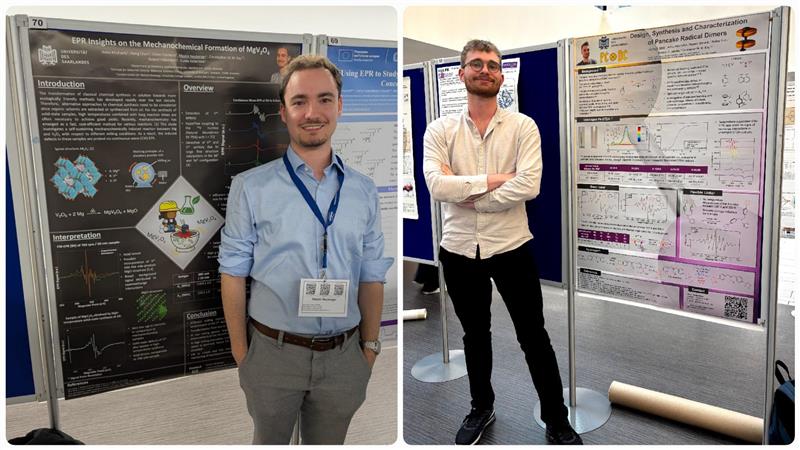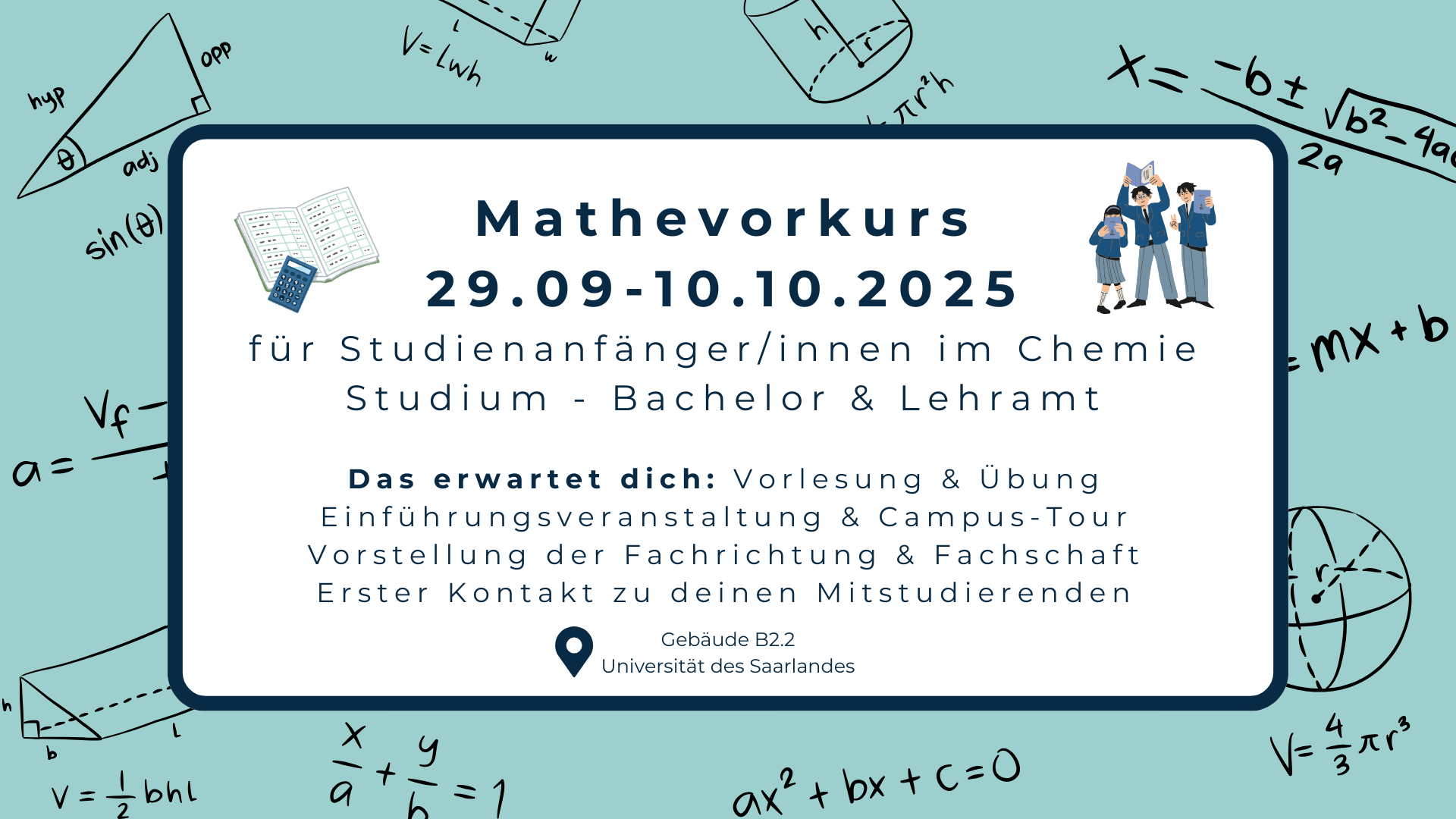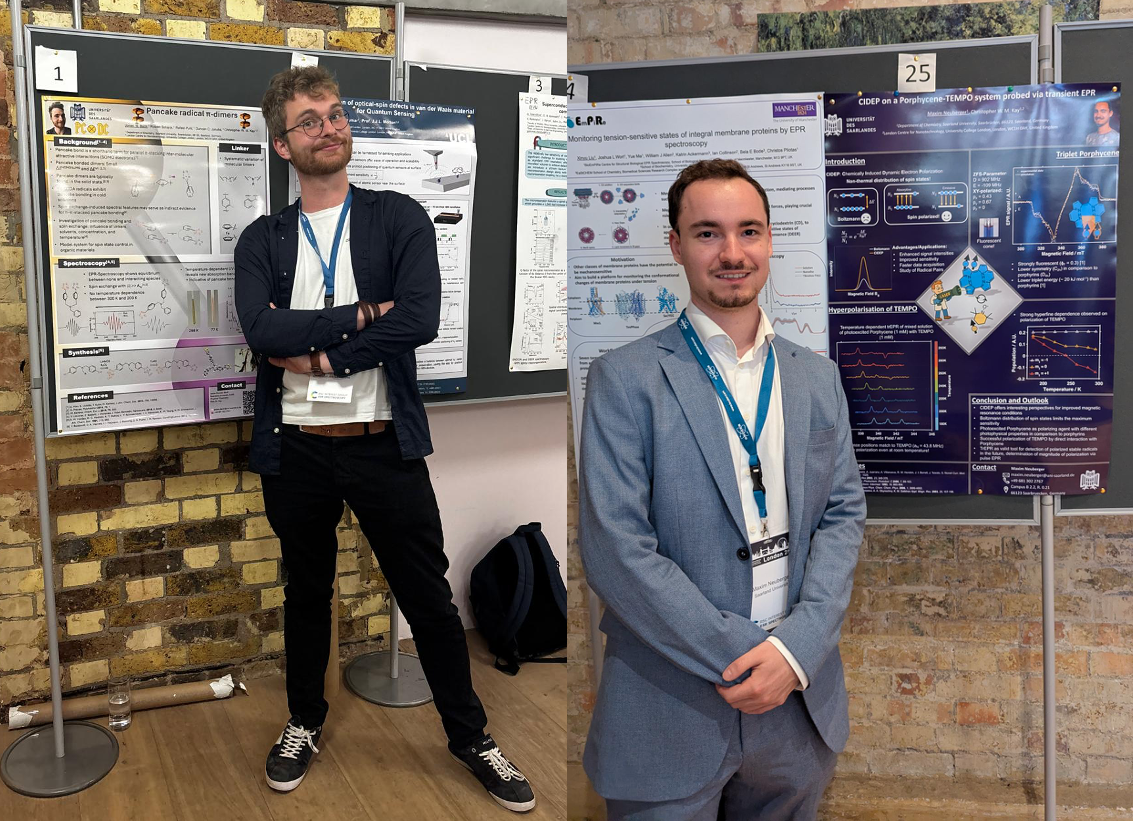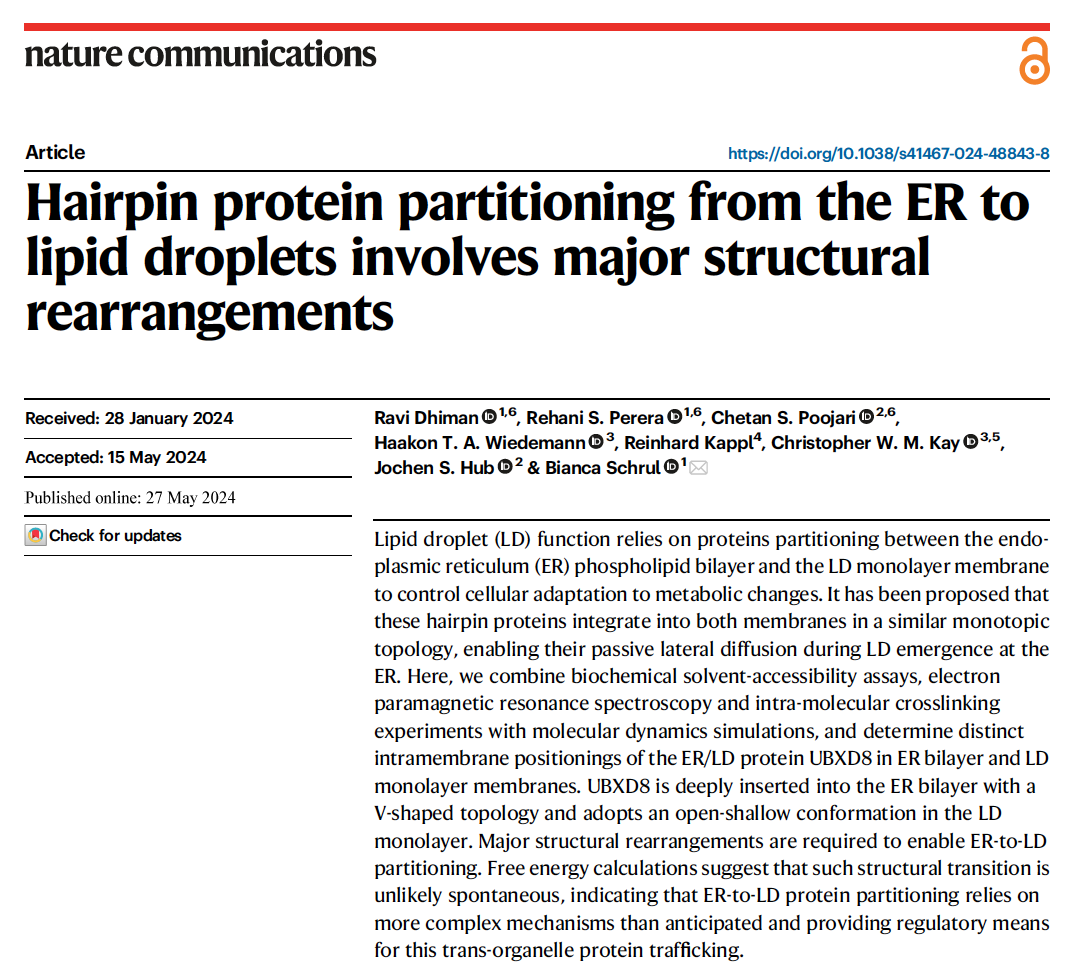These pages give an overview of the research/teaching/training and the people involved. The group has several strands:
-
-
more ESR spectroscopy
ESR spectroscopy
-
more Chemistry Education
Chemistry Education
-
-
-
more Ionic Liquids
Ionic Liquids
-
Mass Spectrometry
more Mass Spectrometry -
Electronic and mechanical Workshop
more Electronic and mechanical Workshop
-
more NanoBioLab
NanoBioLab
-
Teaching
more Teaching -
Download Material
more Download Material
-
PCB Seminar Announcement - WiSe25/26
We are continuing our seminar series, covering the areas Physics, Chemistry and Biology (PCB). As in our first instalment last summer, our guest speakers will report on their current research topics, introducing them from a basic level to allow accessibility for an non-expert audience. The seminars will take place at 16:00 in our ground floor seminar room (B2 2, 0.06).
We hope many will be able to attend. Looking forward seeing you and please feel free to share the announcement.
If you have any questions or comments, please contact Christoph Zollitsch.
Last Friday, the graduation ceremony for the Faculty of Science and Technology at Saarland University took place. Three bachelor's students, three master's students and one doctoral student from the working group received their certificates. Two of the Master's students were also awarded the prize of the German Chemical Society (GDCh) for their achievements in their Master's degree. Members of the working group were also there to support the graduates and celebrate with them.
We warmly congratulate all the graduates at the ceremony!
EPR Summer School Manchester
The 10th EFEPR Summer School took place from 31 August 2025 to 6 September 2025 in Manchester, United Kingdom. This year, two of our employees took part in this training opportunity. The aim of this biennial summer school is to impart fundamental specialist knowledge to young researchers (master's students, doctoral students and postdoctoral researchers) in the field of EPR spectroscopy. To this end, renowned and leading researchers in this field give lectures on topics ranging from the basics to highly specialised measurement techniques within EPR. In addition, participants were given the opportunity to communicate their own research with the help of a poster and to engage in scientific exchange with other participants. Furthermore, direct workshops on selectable topics and direct demonstrations on spectrometers were offered at the Photon Science Institute of the University of Manchester, which provided an opportunity for direct knowledge transfer, as questions or problems encountered during the experimental implementation of experiments could be addressed directly to the respective lecturers. The conference concluded with a very stylish banquet, which we thoroughly enjoyed.
Pre-course in Mathematics 2025
Are you about to start your bachelor's degree or teacher training in chemistry? Then our pre-course in mathematics for first-year students is just right for you! From 29 September to 10 October, you can prepare yourself optimally for the start of your studies (Building B2 2 - 0.06 - start Monday: 10 a.m.). In the morning, you can look forward to exciting lectures, and in the afternoon, you will work in groups on tailored exercises – perfect for applying what you have learned directly.
The first day will start with an introduction, getting to know each other and a campus tour. On 1 October, you will have the opportunity to learn about the field of chemistry and meet some of the professors. In addition, there will be a student council's day with the chemistry student council at lunchtime and a pub crawl in the evening.
Take advantage of this opportunity to get valuable tips, get to know the university and your fellow students, and make contacts with older students.
Detailed information and registration can be found on our Moodle platform and on the first day of the course. We look forward to seeing you!
58th Conference of the EPR Spectroscopy Interest Group of the RSC in London
The 58th International Conference of the EPR Spectroscopy Interest Group of the Royal Society of Chemistry (RSC) took place in London from 1 June to 5 June 2025. Prof Kay, Jonas Bach and Maxim Neuberger from our working group took part. The programme consisted of a 3.5-day marathon of lectures, product presentations and poster sessions by researchers in the field of EPR spectroscopy. Our two PhD students Jonas and Maxim were able to discuss their current projects with other participants and exchange ideas during the poster sessions. At the end of the third day, the conference dinner, kindly sponsored by Bruker, took place at the Ironmonger Hall in London. This included a very historic experience in the old Ironmongers' Guild building in London accompanied by excellent food and good company with other conference delegates. We were delighted to be able to attend this conference and look forward to next year!
PCB Seminar Announcement - SuSe25
We are starting a new seminar series, covering the areas Physics, Chemistry and Biology (PCB). Our guest speakers coming will report on their current research topics, introducing them from a basic level to allow accessibility for an non-expert audience.
Our first seminar will already take place next week Tuesday (13.05.) at 16:00 in our ground floor seminar room (B2 2 - 0.06). Attached is a little flyer with all the dates.
We hope many will be able to attend. Looking forward seeing you.
If you have any questions or comments, please contact Christoph Zollitsch.
Congratulations, Dr Wiedemann!
We are delighted to congratulate Haakon Wiedemann on the successful defence of his dissertation and the award of his doctorate!
With his thesis on ‘From Spins to Solutions: Expanding the Horizons of Electron Spin Resonance (ESR) Spectroscopy’ he has made an outstanding scientific achievement and successfully defended it.
In his work, he combines the experimental and theoretical approaches of magnetic resonance spectroscopy.
His studies range from radical formation in aluminium complexes, mechanochemical reduction processes and dipolar couplings to the characterisation of novel LaCoO₄/graphene nanoparticles and aluminium porphyrins. The development of optimised microwave resonators and investigations into MASER coupling and the dynamics of membrane proteins were also included in the work.
This dissertation deepens the applications and theoretical foundations of ESR spectroscopy and paves the way for interdisciplinary advances in chemistry, physics and biosciences - with innovative impulses for research and technology.
Over the past few years, we have experienced him as a committed, valued and inspiring colleague - for which we would like to express our sincere thanks.
All the best for the future - and continued success!
Harubaru to kokoro tsudoite hana sakaru - When distantminds come together, cherries blossom
Master thesis Maxim Neuberger
We congratulate Maxim Neuberger on successfully completing his master's thesis in the Kay working group!
As part of the master's thesis ‘Molecular Encounters: Unravelling Photoexcited Triplet and Radical Dynamics using EPR Spectroscopy’, the diffusion-controlled dynamics between photoexcited porphyrin dyes and the stable radical TEMPO were investigated. The work includes the analysis of the respective UV/VIS spectra of the dyes using quantum chemical methods as well as the comprehensive characterisation of the magnetic properties of the photoexcited porphyrins and TEMPO. Finally, liquid mixtures of these two components were analysed for a possible polarisation transfer from the excited triplet dye to TEMPO using time-resolved EPR (transient EPR). Polarisation transfer was observed in all mixtures, which can be explained by a number of photophysical processes such as enhanced intersystem crossing (EISC). In the future, this polarisation transfer could find application in the DNP (dynamic nuclear polarization) technique, which aims to significantly improve sensitivity in NMR spectroscopy.
Master thesis Jonas Bach
We would like to congratulate Jonas Bach on successfully completing his Master's thesis, ‘Bridged DTDA radicals: synthesis and characterisation’, in the Kay working group.
The thesis describes the synthesis of so-called dithiadiazolyl radicals connected via a flexible chain. The length and stericity of the chain were chosen so that the radicals could be arranged in an energetically favourable position, promoting the formation of pancake bonds. Exchange interactions between the radicals can be observed in the corresponding EPR spectra. The crystal structure has been obtained, and subsequent doctoral theses will investigate the optoelectronic properties and synthesise further derivatives of bridged DTDA radicals.
Previous News
Das NanoBioLab war von August bis Oktober 2024 für Sanierungsarbeiten vollständig für den Publikumsverkehr geschlossen. Nach dem Umbau wurde das NanoBioLab in einer Feierstunde am 29.10.2024 wiedereröffnet.
Die Feierstunde wurde durch Grußwort und nachfolgendem Festvortrag begonnen, in welchem zukünftige Projekte des NanoBioLabs vorgestellt wurden. Zuvor konnte an Führungen durch das frisch sanierte NanoBioLab teilgenommen werden. Zum Abschluss gab es einen Imbiss mit Sektempfang!
Wir bedanken uns an bei alle Teilnehmer/Innen und allen Mitwirkenden der Feier. Außerdem möchten wir uns bei allen bedanken, die die Sanierung ermöglicht haben! Danke an Hiwis, Studierende, FJSler*innen, Lehrkräfte, Professor*innen und Unterstützer des Labors.
From 15 to 19 September, the 18th Symposium of the Spin Chemistry Meeting (SCM) took place in Kobe, Japan. The programme consisted of five days of interesting lectures, posters and international scientific exchange. The research areas presented showed the broad versatility in the application of electron spin resonance (ESR): from spintronics to materials science and biological applications, interesting new findings were presented. Many doctoral students (including one of our employees) also used this opportunity to present their own doctoral theses and the associated international research from many different countries. The presentations were complemented by many coffee breaks and delicious Japanese food. The conference ended with the conference dinner, which was a very successful conclusion to the conference. After the conference, our employees also went on an excursion to Saitama University in Tokyo. The trip was rounded off with a cultural visit to the Kamakura district, where many Buddhist and Shinto temples could be seen.
We are looking forward to future conferences, as they are an ideal networking opportunity and a source of inspiration to keep up to date with the latest research.
Are you about to start your bachelor's or teacher study in chemistry? Then our maths pre-course for first-year students is just right for you! From 30 September to 11 October, you can optimally prepare for the start of your studies. Exciting lectures await you in the morning and in the afternoon you will work in groups on customised exercises - perfect for directly applying what you have learned.
The first day starts with an introduction, getting to know each other and a campus tour. On 10 October, you will have the chance to get to know the chemistry department and some of the professors. There will also be a Freshers' Day with the Chemistry Student Council after lunchtime and the Chemistry Student Council's pub crawl in the evening.
Take the opportunity to get valuable tips, get to know the university and your fellow students and make contacts with older students.
Register now via the Link! You can find detailed information on our Moodle platform and on the first day of the course. We look forward to seeing you!
(Photos: www.uni-saarland.de/universitaet/aktuell/fotos.html )
Fats are the most important energy stores in the human body and are stored in lipid droplets within cells. Very little is known about how these droplets work. However, a team led by Saarland University biologist Bianca Schrul, in collaboration with our research group, has gained insights into a specific protein in the envelope of these lipid droplets.
Their work, published in the renowned journal Nature Communications, focuses on a protein called UBXD8 that is found in the lipid droplet envelope. Proteins play an important role in cells, for example by ensuring that messenger substances and energy enter and leave individual cell organelles and cells as a whole. What makes proteins such as UBXD8 special is that they function in both the endoplasmic reticulum (ER), a net-like structure within the cell, and the lipid droplet envelope. Lipid droplets are formed in the ER by protruding from its membrane, acting as small fat storage spheres.
With our assistance, Bianca Schrul's research team was able to experimentally disprove the current theory that UBXD8 is passively integrated into the lipid droplet membrane, i.e. without further external influence or major changes in shape.
This opens the door to further research that could help us to better understand metabolic diseases.
The annual conference of the ESR interest group of the Royal Society of Chemistry (RSC) took place at the University of Warwick in Coventry, England, from 8 to 10 April 2014. The programme consisted of three days with a lot of interesting lectures, posters and scientific exchange. The research areas presented emphasised the broad versatility in the application of electron spin resonance: from biological studies on proteins to catalysis and the link between 3D printing and ESR. Many doctoral students also used this opportunity to present their own doctoral theses and the associated international research from many different countries. The presentations were complemented by many coffee breaks and very tasty English food. The conference ended with the conference dinner, which was a very successful conclusion to the conference.
Following this conference, our employees also went on a short excursion to University College London (UCL) on Thursday, where Prof Kay also holds a professorship. The trip was rounded off with a culinary visit to an Indian restaurant in London, which was a great pleasure for everyone.
We are looking forward to future conferences, as they are an ideal source of inspiration and information to keep us up to date with the latest research.
The event started with an opening speech and presentations on developments in Bruker's product range. At lunchtime there were guest lectures by researchers on their field of research at the ESR. A tour of Bruker's test laboratories with numerous spectrometers was the highlight of the day. At the end, there was a lively discussion about things Bruker could improve to keep the user experience high. In between there were many breaks with plenty of food and drink.
Contact Prof. Kay
Prof. Dr. Christopher W. M. Kay
Building B2 2 Room 0.24
Tel: +49 681 302 2213
Fax: +49 681 302 4759
christopher.kay(at)uni-saarland.de
Contact Secretary
Petra Theobald
Building B2 2 Room 0.22
Tel: +49 681 302 2473
Fax: +49 681 302 4759
p.theobald(at)mx.uni-saarland.de
Monday and Wednesday: 8 o'clock (a.m.) to 2 o'clock (p.m.) - Building B2 2 Room 0.22/ 1.25
Tuesday and Thursday: 8 o'clock (a.m.) to 2 o'clock (p.m.) - Homeoffice
Responsible for the content of this website
Prof. Dr. Christopher W. M. Kay
Building B2 2 Room 0.24
Tel: +49 681 302 2213
Fax: +49 681 302 4759
christopher.kay(at)uni-saarland.de













